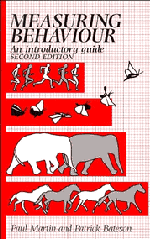Book contents
- Frontmatter
- Contents
- Preface to first edition
- Preface to second edition
- Summary: the steps involved in measuring behaviour
- 1 Introduction
- 2 General issues
- 3 Research design
- 4 Preliminaries to measurement
- 5 Measures of behaviour
- 6 Recording methods
- 7 The recording medium
- 8 The reliability and validity of measures
- 9 Analysis and interpretation of data
- Appendices
- 1 Guidelines for the use of animals in research
- 2 SI units of measurement
- 3 Summary of questions commonly asked in statistical analysis
- 4 A miniature electronic beeper for time sampling
- Annotated bibliography
- Index
3 - Summary of questions commonly asked in statistical analysis
Published online by Cambridge University Press: 05 June 2012
- Frontmatter
- Contents
- Preface to first edition
- Preface to second edition
- Summary: the steps involved in measuring behaviour
- 1 Introduction
- 2 General issues
- 3 Research design
- 4 Preliminaries to measurement
- 5 Measures of behaviour
- 6 Recording methods
- 7 The recording medium
- 8 The reliability and validity of measures
- 9 Analysis and interpretation of data
- Appendices
- 1 Guidelines for the use of animals in research
- 2 SI units of measurement
- 3 Summary of questions commonly asked in statistical analysis
- 4 A miniature electronic beeper for time sampling
- Annotated bibliography
- Index
Summary
Some of the more common statistical tests are listed here, according to the purposes for which they are used. Tests marked with an asterisk (*) are parametric and make more rigorous assumptions about the character of the data than do the non-parametric tests.
• Does the sample come from a specified population?
e.g. Chi square test for goodness of fit for a single sample Binomial test
• Are the scores of two unrelated samples different?
e.g. Chi square test for two independent samples Mann–Whitney U test
Student's t test for unmatched samples*
• Are the scores of two related samples different?
e.g. Wilcoxon matched-pairs test
Student's t test for matched samples*
• Are the scores of several unrelated samples different from each other?
e.g. Chi square test for more than two independent samples
Kruskal–Wallis one-way analysis of variance
Analysis of variance* (particularly when one variable may depend on two or more conditions)
• Are the scores of several related samples different from each other?
e.g. Friedman two-way analysis of variance
Repeated measures analysis of variance*
• Are two sets of scores associated?
e.g. Spearman correlation
Pearson correlation*
Simple regression* (when one variable may depend on another)
• Are several sets of scores associated?
e.g. Kendall coefficient of concordance
Multiple correlation*
Multiple regression* (when one variable may depend on others)
• Do more than one set of scores depend on more than one condition?
e.g. Multivariate analysis of variance*
- Type
- Chapter
- Information
- Measuring BehaviourAn Introductory Guide, pp. 171 - 172Publisher: Cambridge University PressPrint publication year: 1993



